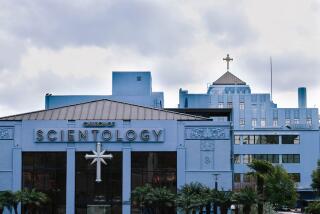Christian Science Church Officials Quit Amid Split : Religion: Resignations come after reports of pension funds being used to prop up new cable TV network.
- Share via
WASHINGTON — The chairman and other top officials of the Christian Science Church resigned Monday after reports that pension funds had been misused to prop up the church’s struggling television empire and amid a split over the church’s future.
Harvey Wood, who had overseen the church’s recent move into broadcasting, resigned as chairman of the board after 15 years as a director, and the church said it would shut down its new cable television network, the Monitor Channel, unless a buyer is found by June 15.
Among other changes, the church also has reorganized so that board members will take on direct roles as editors of the separate secular and religious broadcasting and publishing operations. Virginia S. Harris will replace Wood as chairman and Al M. Carnesciali of Costa Mesa, Calif., will fill Wood’s vacancy on the board.
The church, which was founded in Boston by Mary Baker Eddy 125 years ago, said the changes would not affect its venerable daily newspaper, the Christian Science Monitor, and its circulation of an estimated 120,000, or the monthly World Monitor magazine.
But followers were split over whether the changes represented .any real shift in the unique American church’s direction, which has bitterly divided the faith. That dispute involves both how much effort should be put into the church’s unusual dedication to journalism and whether there is something different and fundamentally superficial about broadcasting versus the printed word.
In recent years, the church, which is dedicated both to healing by faith and to education through international journalism, has struggled to keep members. In reaction, Wood and other elders moved increasingly toward broadcasting as a way to attract followers, including a dramatic change three years ago that cut the cost and size of the Monitor newspaper.
Some members felt that the television ventures, including a nightly news program and later the church’s own cable channel, were diverting too much away from other church activities and that television debased the ideas the founder was dedicated to. Three years ago, the top three editors of the Monitor newspaper, the church’s most famous entity, even resigned in protest.
“Today’s resignations really mark the failure of an attempt to turn the church into something it wasn’t: a secular media empire,” Stephen Gottschalk, a Christian Science historian, told the Associated Press.
But new board member Carnesciali insisted in a prepared statement that “this in no way indicates that we are giving up our involvement in any of the publishing and broadcasting media that people normally use today to obtain their news and information.”
Four of the five members of the church board of trustees will keep their posts, and some of those resigning some posts will keep others.
As one high ranking church member, asking for anonymity, put it: “Whether it is a housecleaning or window-dressing, we can’t say today.”
An internal memo sent Monday from the trustees of the church’s publishing society to all employees suggested that church officials blamed the media, not management, for their own media’s financial problems. “We have never experienced anything comparable to the present intensity, involving front-page stories day after day. Finally, this onslaught began to spill over from a hostile local press to the (television) trade press.”
The memo, a copy of which was provided to The Times, also blamed internal critics for the media attention. “Given the prospect of continuing opposition within our church ranks, we must now face the necessity of an outright sale of the Monitor Channel to an outside party.”
Monday’s developments follow two recent controversies that also have caused a stir in the church.
First, the church published a book that it had denounced as heretical when it was written and privately published 45 years ago. Contrary to church doctrine, the book compared Eddy to Jesus Christ.
Critics charged church elders had reversed themselves for simple greed. Under terms of the will of its late author, Bliss Knapp, if the church published the book and made it available in Christian Science reading rooms worldwide by May, 1993, the church would get nearly $93 million from the author’s estate.
Stanford University and the Los Angles County Museum of Art are contesting the bequest. They are recipients of the money if the church does not get it. And two weeks ago a California court delayed the church bequest.
Then a week ago the church acknowledged that it had borrowed $41.5 million from its employee pension fund since Jan. 1 to underwrite the Monitor Channel and the Monitor newspaper.
Church management last September also borrowed another $20 million from the church endowment for similar purposes but paid it back last month with interest equal to the prime rate plus one point.
Part of the problem is the church’s cable Monitor Channel, which went on the air last May, after the church’s nightly newscast was dropped by the Discovery Channel. It cost the church $250 million to launch the cable channel, which reportedly requires $4 million a month to operate.
Other changes announced Monday: Anetta Douglas will resign as manager of the church’s publishing society but remain executive director of radio and television programming. John H. Hoagland will resign June 15 as a trustee of the church’s publishing society but remain chairman of Monitor Television. And Hal M. Friesen of Newport Beach, Calif., will resign as another publishing trustee.
There are 2,600 Christian Science churches worldwide, about 1,884 of them in the United States. The church said that no figures are kept on membership, although estimates have ranged from 250,000 to as high as 650,000.
Times staff writer Lynn Smith, in Orange County, contributed to this story.
More to Read
Sign up for Essential California
The most important California stories and recommendations in your inbox every morning.
You may occasionally receive promotional content from the Los Angeles Times.













